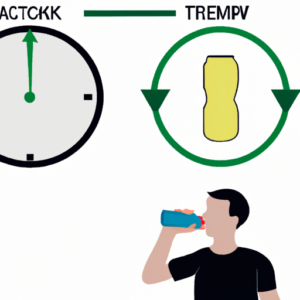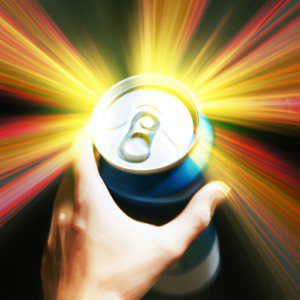Energy drinks are becoming increasingly popular for those looking to enhance physical performance.
The purpose of this article is to provide an overview of the ingredients, benefits and potential risks associated with energy drink consumption.
The composition of energy drinks vary greatly depending on the brand and formula used; however, they typically contain various combinations of caffeine, B vitamins, taurine and other herbs or supplements designed to promote alertness and endurance.
Studies suggest that increased intake of these components can improve cognitive function as well as muscular strength during exercise. Furthermore, research indicates that regular use may reduce fatigue levels post-exercise and increase general feelings of wellbeing in athletes.
Despite these potential advantages, it should be noted that excessive intake could potentially lead to adverse health effects due to high sugar content or overconsumption of stimulants such as caffeine.
Composition Of Energy Drinks
Energy drinks are increasingly popular in modern society and have become an integral part of the everyday lives of many individuals. It is no longer uncommon to see people consuming energy drinks while carrying out their daily activities, whether it be studying for exams or working at the office – these beverages seem to be a go-to choice when needing that extra boost.
But what exactly do they contain? Let’s take a look back in time and find out!
At its most basic form, an energy drink consists of sugar and caffeine which work together synergistically to enhance physical performance. Energy drinks typically have high sugar content with some brands containing up to 34g per 8 ounces serving; this amount surpasses the recommended daily intake by over 70%.
Caffeine levels vary between brands but generally range from 50mg-200mg per 8 ounces serving. This can result in feelings of jitteriness, anxiety and restlessness if consumed in excess amounts.
It is important to note that not all energy drinks are created equal and it is essential to read labels before purchasing any product. Understanding the composition of such beverages will help you make informed choices about your dietary needs – empowering you along the way!
Benefits Of Drinking Energy Drinks
Energy drinks, composed of various ingredients such as sugar and caffeine, are widely consumed for their perceived benefits. The effects of these beverages on physical performance have been studied extensively in recent years.
Sugar content has been shown to be a key factor when it comes to the impact energy drinks can have on enhanced physical performance. High levels of sugar can provide an immediate increase in available energy which may lead to improved physical activity results.
Caffeine is another major component that plays a role in potential improvements due to its ability to stimulate the central nervous system and cause alertness and increased focus. However, excessive intake should be avoided as it can lead to adverse side-effects such as insomnia or jitteriness.
The following elements should also be considered when evaluating the usefulness of energy drinks:
– Hydration level – Ensuring adequate hydration before consuming an energy drink will help maximize any potential positive impacts on physical performance
– Timing – Consuming an energy drink prior to strenuous activity provides optimal benefit
– Dosage – Moderation is essential; sticking within recommended limits will help ensure safety while taking advantage of possible increases in endurance and strength
– Nutritional balance – If using energy drinks as part of a regular exercise regimen, then additional nutrients found naturally in foods should not be neglected
In addition to these considerations, it is important to note that individual body chemistry must also be taken into account when assessing the efficacy of this type of beverage for enhancing performance. Taking into consideration all factors related to composition and usage can assist with making informed decisions about utilizing energy drinks for increasing physical capabilities.
Potential Risks Of Energy Drink Consumption
Recent studies have indicated that energy drinks contain high levels of caffeine, which can cause dehydration and electrolyte imbalances.
Additionally, research suggests that energy drink consumption is associated with an increased risk of arrhythmia, hypertension, and other adverse cardiovascular effects.
Thus, long-term energy drink consumption should be monitored carefully, as it may have a significant impact on overall health and physical performance.
It is important to remember that energy drinks should not be used as a substitute for other beverages, such as water, which are essential for proper hydration and health.
Dehydration
Consumption of energy drinks can have severe health consequences if not monitored properly.
One such consequence is dehydration due to the high concentration of caffeine present in these beverages.
Caffeine acts as a diuretic, meaning it increases urination; this, in turn, causes an imbalance in hydration and electrolyte balance.
The body is unable to adequately replenish lost fluids and electrolytes with energy drink consumption alone which can lead to serious symptoms including dry mouth, headache, dizziness, decreased urine output and dark colored urine.
Furthermore, dehydration may also cause fatigue and muscle cramps during physical activity making exercise more challenging.
It is important for individuals who choose to consume energy drinks to ensure they are drinking adequate amounts of water throughout the day to maintain their hydration levels and prevent any potential complications associated with inadequate hydration.
Cardiovascular Effects
The cardiovascular system can also be affected by energy drink consumption.
Studies have shown that consuming energy drinks prior to endurance training may have a negative effect on performance due to an increase in blood pressure and heart rate.
The high levels of caffeine present in these beverages can cause the body to experience increased adrenaline production, leading to increased stress hormones which can put strain on the cardiovascular system.
Additionally, mental focus may be impaired with overconsumption of energy drinks as studies suggest that higher doses of caffeine may lead to attention deficits and difficulty concentrating.
As such, it is important for individuals engaging in physical activity or requiring enhanced mental focus to monitor their intake of energy drinks accordingly in order to avoid any potential cardiovascular risks associated with excessive consumption.
Effects On Cognitive Function And Muscular Strength
The effects of energy drinks on cognitive function and muscular strength have been widely studied. While the stimulant effects of these beverages can provide a short-term boost, their long-term benefits remain unclear. Questions are raised regarding the potential negative impacts of high calorie intake through energy drinks and its impact on physical performance.
Research into how energy drinks affect cognitive functions has focused on alertness and reaction times. Studies suggest that consuming an energy drink prior to exercise or activities can increase mental focus and speed up reaction time. However, further research is needed to determine if this effect translates into improved performance in terms of muscle power or endurance during physical activity.
In regards to muscle strength and endurance, results from studies investigating the role of energy drinks have been mixed. Some studies point towards positive outcomes; however, other findings indicate no difference between individuals who consume them versus those who don’t.
As such, more evidence is required before making any definitive conclusions about whether consumption leads to enhanced physical performance or not. It appears that individual factors may play a significant role in determining the effectiveness of energy drinks for improving muscle strength or endurance.
Impact On Fatigue Levels And Wellbeing
The impact of energy drinks on fatigue levels and wellbeing has been a subject of much research.
Studies have shown that the consumption of energy drinks can provide short-term benefits in terms of increasing alertness, focus, and concentration.
However, less is known about the long-term effects that these beverages may have on overall health and wellbeing.
One study conducted by researchers at Harvard University found that drinking an energy drink before exercise had no significant effect on physical performance compared to when no beverage was consumed.
Furthermore, this same study revealed a potential relationship between high caffeine intake from energy drinks and lower quality sleep.
This could indicate that overconsumption of caffeine from such beverages might lead to decreased fatigue levels in the short term but may also disrupt normal sleeping patterns which could lead to long-term negative effects for overall health and wellbeing.
It is important for individuals who consume energy drinks regularly to consider their impact not only in terms of immediate improvements in performance or alertness but also with respect to potential long-term consequences related to sleep disturbances or other adverse side effects.
It is recommended that people monitor closely how often they are consuming these types of beverages as well as considering alternative strategies for improving fatigue levels or enhancing physical performance such as proper hydration, adequate sleep hygiene practices, and regular physical activity.
Frequently Asked Questions
What Is The Recommended Daily Intake Of Energy Drinks?
The recommended daily intake of energy drinks varies depending on the individual, as well as the ingredients in each drink.
Generally speaking, it is advised that individuals limit their energy drink consumption to no more than two cans per day, and less for those under 18 years old.
Health professionals also recommend avoiding or limiting caffeine from other sources such as coffee and tea when consuming energy drinks to avoid potential risks associated with excessive amounts of caffeine and other energy-boosting ingredients.
Are Energy Drinks Safe For People With Certain Medical Conditions?
The potential risks associated with excessive consumption of energy drinks are a cause for concern, particularly for those with certain medical conditions.
While these beverages may offer an initial boost to physical performance, their high caffeine and sugar content can lead to serious heart risks in some individuals when consumed in excess.
Nutritionists and dietitians often recommend that people take caution before consuming too many energy drinks, as they can have detrimental effects on the cardiovascular system if not taken responsibly.
Are Energy Drinks More Beneficial Than Other Sources Of Caffeine?
Caffeine is a widely used stimulant and can be found in many foods and beverages.
Caffeine from energy drinks may provide short-term mental alertness during physical activity, however other sources of caffeine such as coffee or tea may also offer the same benefits.
When considering lifestyle choices to achieve optimal performance, it is important to consider all available options for obtaining caffeine before making a decision about which one will work best for the individual.
Alternatives to energy drinks include black and green teas, yerba mate, chocolate bars with cocoa powder, some types of fruit juices, soft drinks and certain types of nuts.
It’s essential that individuals evaluate their caffeine intake carefully to ensure they are consuming appropriate amounts based on their age and health status.
What Are The Long-Term Effects Of Energy Drinks On The Body?
An abundance of research has been conducted to explore the long-term effects of energy drinks on the body, yet it is still unclear as to what short and long term outcomes may be.
As such, a figurative ‘cloud of uncertainty’ continues to linger around this issue.
Though product labeling and marketing tactics have highlighted certain claims, scrutiny is required due to conflicting findings in various studies involving athletes and non-athletes who consume these products.
From a nutritional standpoint, more extensive research needs to be conducted before any definitive conclusions can be made about the purported benefits or potential harm associated with regular consumption of energy drinks.
Are Energy Drinks Safe For Children To Consume?
The question of whether energy drinks are safe for children to consume is a complex one.
While the caffeine content in many energy drinks can be beneficial as an alternative to coffee or soda, it is important to ensure that proper hydration levels are being maintained by supplying plenty of water throughout the day.
Additionally, it is recommended that children avoid consuming more than 100mg of caffeine per day and that parents consult with their pediatrician regarding any potential risks associated with energy drink consumption in younger individuals.
Conclusion
It is clear that energy drinks can be beneficial for physical performance and mental alertness, but it is important to consider the potential risks.
It is recommended to limit consumption of energy drinks due to their high caffeine content, especially in individuals with medical conditions or children who may not understand the effects of consuming large amounts of caffeine.
While some people believe that other sources such as coffee are better than energy drinks, scientific evidence indicates that both contain similar levels of caffeine and have comparable impacts on the body.
In conclusion, although there are potential benefits associated with using energy drinks, caution must be taken when considering them as a source of caffeine.
People should be aware of their personal health needs and consult a healthcare professional before making dietary changes related to these beverages. By doing so, they will reduce the risk of any negative side-effects while still experiencing the positive aspects associated with improved physical performance and mental alertness.




